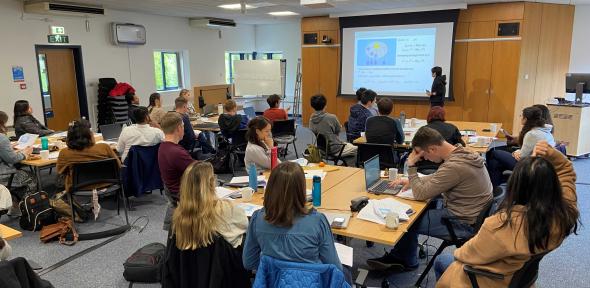
The MRC Biostatistics Unit run a number of successful online and in-person courses in statistics on a range of topics at different levels, for statistical, clinical and other audiences.
Online courses take place through the University of Cambridge’s Moodle platform, while in-person courses normally take place in Cambridge at the East Forvie Building on the Cambridge Biomedical Campus.
Further information about our upcoming courses is given below.
Genetics in Drug Development, November 2025
Mendelian Randomization course, November 2025
Description: Studies based on Mendelian randomization are increasingly being used to distinguish causal relationships from observational associations in epidemiology and to prioritize potential targets for pharmaceutical intervention. This course intends to explain both simple and more complex statistical methods for causal inference in Mendelian randomization studies, and the instrumental variable assumptions on which they are based. The course includes several computing practicals in R.
Location: Online
Duration: 3 weeks, 4 live sessions per week (x2 courses per year)
Course Tutors: Dr Stephen Burgess (MRC Biostatistics Unit, University of Cambridge), Dr Ville Karhunen (MRC Biostatistics Unit, University of Cambridge), Dr Janne Pott (MRC Biostatistics Unit, University of Cambridge), Dr Ang Zhou (MRC Biostatistics Unit, University of Cambridge), Dr Amy Mason (Cardiovascular Epidemiology Unit, University of Cambridge), Dr Dipender Gill (Sequoia Genetics/Imperial College London)
Upcoming course dates: 3rd – 21st November 2025
Course fee:
- Student Registration £200.00
- Academic / Non-profit Registration £380.00
- Private sector / Commercial Registration £500.00
Registration: Mendelian Randomization course | November 2025
More information: Mendelian Randomization course (mendelianrandomization.com)
Bayesian Statistics Online Short Course, November 2025
Description
Course aims
This short course introduces students to Bayesian statistical methods in biomedical settings, and provides skills for designing, assessing and interpreting Bayesian analyses using the R and JAGS statistical software. The emphasis throughout will be on practical, applied modelling: code to carry out analyses will be provided.
Course outline
The course runs on the Moodle online learning platform, and involves 7 sessions:
1. Quantifying uncertainty with probability
2. Bayesian inference
3. Bayesian regression models
4. Critiquing and comparing Bayesian models
5. Hierarchical models
6. Modelling with missing and censored data
7. Integrating multiple sources of data
Course delivery
The course will be delivered via the Moodle online learning platform. The course consists of 7 half-days worth of content, and will take place over 7 half-days across 3 weeks starting on Friday 7th November 2025.
It will consist of some on-demand content and some timetabled (live) sessions.
University of Cambridge Students and Staff, whose department will be covering the participation cost, please raise a Purchase Order (or contact a member of your department who can assist with this) and send a PDF of the Purchase Order to courses@mrc-bsu.cam.ac.uk . You will then be sent the passcode which you will need to use along with the Purchase Order number to complete registration below, selecting the 'UoC Student/Staff Registration' option.
Adaptive Methods in Clinical Research, 17-19 November 2025
Description
Many confirmatory clinical trials turn out to be negative and do not lead to the registration of a new drug or the introduction of a new treatment. Consequently, there is growing interest amongst clinical researchers in the use of efficient methods for conducting early and late phase trials to identify the most promising compounds, and in using interim analyses to allow trials to be stopped as soon as there is sufficient evidence to reach a convincing conclusion.
Adaptive designs allow mid-trial modifications to be made to the trial so that the accumulating data guides investigators to the most appropriate form of evaluation. While offering great flexibility during the trial, they require specialised approaches to be designed and analysed.
Dates
Monday 17th of November – Wednesday 19th of November 2025 (3 full days)
University of Cambridge Students and Staff, whose department will be covering the participation cost, please raise a Purchase Order (or contact a member of your department who can assist with this) and send a PDF of the Purchase Order to courses@mrc-bsu.cam.ac.uk . You will then be sent the passcode which you will need to use along with the Purchase Order number to complete registration below, selecting the 'UoC Student/Staff Registration' option.
Registration Adaptive Methods in Clinical Research, 17-19 November 2025
PLEASE NOTE THAT THIS COURSE WILL BE RUN AT
CLINICAL SCHOOL -
Addenbrooke's Hospital, Hills Rd, Cambridge CB2 0SP

